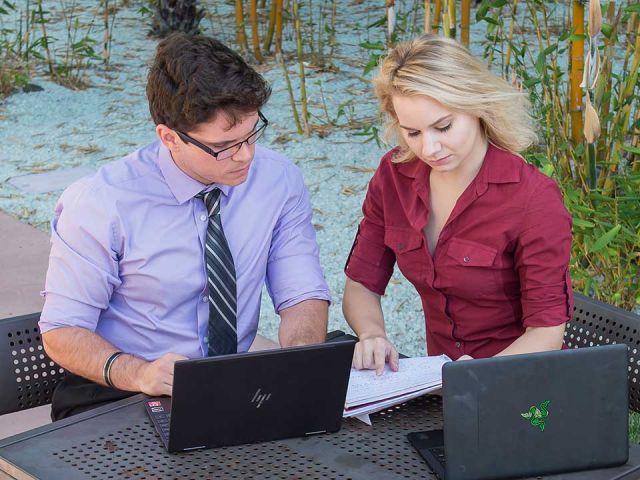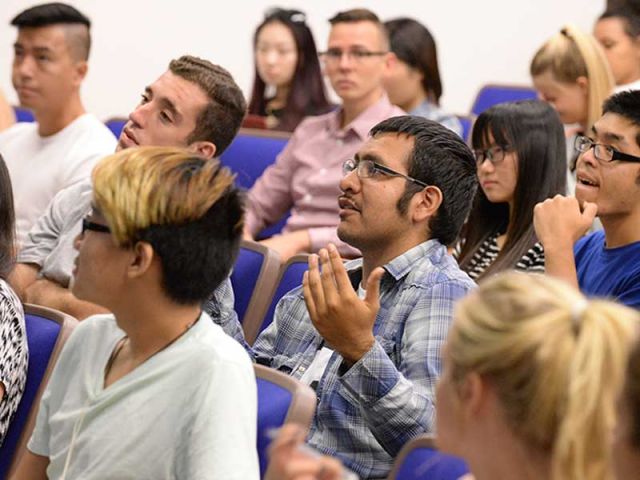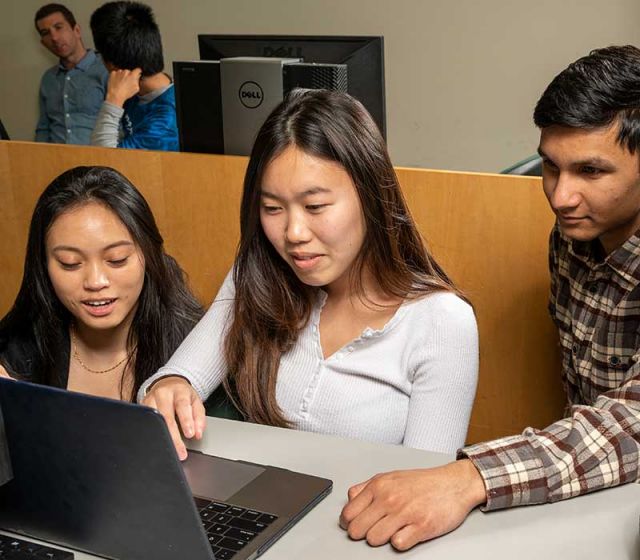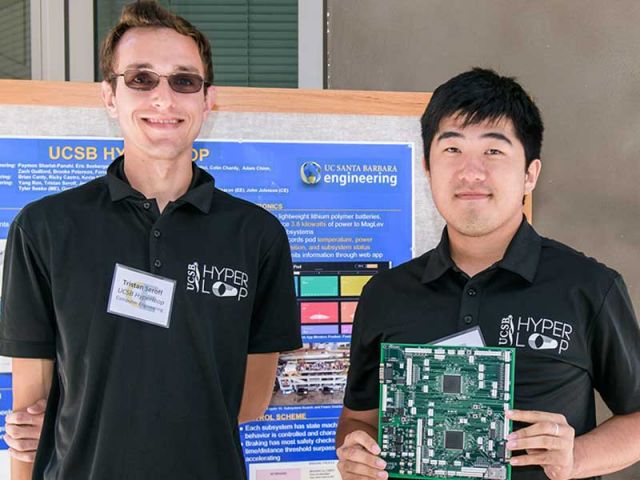Frosh to Sr. Year Timeline & Advising
Each of the four years in the curriculum followed by a typical computer engineering undergraduate student has a distinct flavor in terms of the types of courses taken, academic goals, and milestones achieved.
The following sections present an overall picture of these four years, provide a sense of the progress made toward graduation, and list specific things to do in order to stay on track. Included with graduation checks and guidelines are steps to take by students who would like to pursue graduate studies in the framework of the BS/MS program.

Freshman Year
Coursework: Besides completing a number of units to fulfill parts of the general education requirements, a CE freshman prepares for specialized subjects in the major by taking mathematics, physics, computer programming, and writing courses. Some students may already enter the program with credit for certain courses through appropriate AP or equivalent credit.
Learn and Experience: Mathematics, basic science, programming, and writing courses provide tools that render specialized courses taken by students in later years both accessible and enjoyable. Two required 1-unit freshman seminars, taken during Winter and Spring, introduce the students to interesting technical and research problems in Computer Engineering via tutorial / overview lectures and mathematical / logical puzzles.
Curriculum Reminders and To-Dos:
- "Discover Engineering" College of Engineering Welcome Event & ECE Orientation Meeting: scheduled during the week prior to the start of Fall quarter.
- Advisor Assignments: announced by the ECE Student Affairs Office – early Fall quarter.

Sophomore Year
Coursework: Basic hardware and software courses begin the journey toward professional standing in computer engineering. Hardware-related courses introduce students to circuits and logic design, while software-related courses deal with advanced programming topics and systems software. Exposure to mathematics and physics subjects continues in this second year.
Learn and Experience: The foundations of students’ understanding of computer hardware and software are laid in the sophomore year. By the end of this year, students have become sophisticated computer users and have acquired a basic understanding of how the underlying circuits of typical electronic digital computers work.
Curriculum Reminders and To-Dos:
- Consider meeting with a faculty advisor.

Junior Year
Coursework: The most important and widely applicable topics in computer engineering constitute the focus of courses in this third year. These include courses on computer architecture & data structures. Students begin selection of CE Senior Electives as well as completion of Capstone Sr. project prerequisite coursework. Most students also complete the general education requirements during this third year.
Learn and Experience: Mastering technical hardware and software topics, that form the common language of computer engineering, is required for understanding other upper division courses, but it also forms a foundation for many graduate-level courses. Given that CE students branch out into different specialty areas during the senior year, this common core knowledge is important for effective communication among colleagues in the workplace and in other teamwork contexts.
Curriculum Reminders and To-Dos:
- Mandatory Junior Meeting to discuss Senior Electives and BS/MS Program: Early Fall quarter.
- Senior Elective Sheet Deadline: During Spring quarter.
- ECE BS/MS Application Deadline: Last day of Spring quarter.
- CS BS/MS Application Deadline: Spring quarter of 3rd year.

Senior Year
Coursework: The focus in this fourth year is on elective subjects and the Senior Capstone Project. A key component in elective units is the choice of two different 2-course sequences (Senior Elective Sequences). Such sequences are available in computer networks, computer systems design, design & test automation, distributed systems, machine learning, multimedia, programming languages, real-time computing & control, robotics, signals & systems, system software architecture, very large scale integration.
Learn and Experience: Two-course sequences provide specialization and depth in areas of interest to students. Other electives allow exploration of additional areas for breadth. The senior capstone project, considered an academic career highlight by most students, provides an opportunity to participate in a team project, starting from problem definition & requirements formulation and ending with the demonstration of a fully functional, tested, & documented product during Senior Capstone Project events.
Curriculum Reminders and To-Dos:
- BS/MS Students: see ECE Student Affairs Manager if advancing to MS status.
- MS or MS/PhD ECE or CS Graduate Application: due December 15th.
- Progress Check on GOLD: student-initiated for timely degree completion.
- Undergraduate Advisor Meeting: confirm that all graduation requirements are completed.
Three Tiers of CE Advising
Student advising for the CE Program is administered by the ECE Department. Advisors in the following areas are available to students:
CoE Undergrad Advisor
- CoE & University Level
-
- university policies and procedures
- general education courses
- progress and graduation checks
- academic probation
- academic petitions
- changing majors
- transferring credits from other institutions
- education abroad, honors program, and other opportunities
ECE (CE) Undergrad Advisor
- Major Level
-
- general "go to" advisor
- major requirements
- policies and procedures
- yearly progress checks
- course planning
- scheduling
- ECE course enrollment
- prerequisite changes
- selecting and approving senior electives
CE Faculty Advisor
- Content Level
-
- assigned annually
- content level course materials
- recommendations
- academic and grad school planning
- research opportunities and career planning
Undergraduate Advisors
College of Engineering
CoE Office of Undergraduate Studies
(805) 893-2809 | HFH, Rm 1006
coe-info@engineering.ucsb.edu
CE Undergraduate
Beth English
Trailer 380, Rm 105
(805) 893-8292
ugrad-advisor@ece.ucsb.edu
Joanna Villalobos
Trailer 380, Rm 101
(805) 893-5368
undergrad@ece.ucsb.edu
CE Program Faculty
Contact the ECE Undergraduate Advisor
ugrad-advisor@ece.ucsb.edu & undergrad@ece.ucsb.edu
Curriculum Questions?
- MAJOR – degree requirements <ugrad-advisor@ece.ucsb.edu OR undergrad@ece.ucsb.edu>
- GENERAL ED – CoE & UCSB <coe-info@engineering.ucsb.edu>
Not sure? Contact the ECE Undergraduate Advisor <ugrad-advisor@ece.ucsb.edu OR undergrad@ece.ucsb.edu>